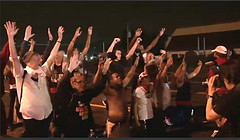Looking Out for Each Other
Following the events in Ferguson, MO, breaks my heart. Read that sentence carefully. The events in Ferguson, of course, break my heart. Eighteen year olds should not be shot by the police, ever. It doesn’t matter what they did, or what they might have done. We shouldn’t live in a time and place where that happens.
But following the events has also broken my heart. The week that Michael Brown was shot, social media feeds made it clear that we split, as a country, across racial lines, in what we give our attention to. The world’s sadness is not a pissing contest. It’s horribly sad that Robin Williams died. It’s horribly sad that Michael Brown died. But if you have friends of different races, I bet you noticed the difference in your social media feed, too.
And then, as everyone started to pay attention to Ferguson, there was some sense of shock by many white people: that this sort of thing was happening all the time.
Finally, we were all paying attention to the same thing, but here’s what I notice: in terms of our interaction online, even white Americans who are horrified by what happened in Ferguson and want to work on race relations, even these folks (and I include myself in this) are mostly only talking to other white people about it. There are lots of reasons. We don’t have many black friends. We’re scared that if we wade into issues of race, we’ll make a misstep and go under when we say something that we didn’t even realize was racist or incendiary. We’ve been burned before, trying to talk about it, and saying the wrong thing. I suspect there are reasons, too, why African Americans might be a bit reluctant to engage even well-meaning whites on the issue. (I’m sure there’s something I’m writing in this post that is somehow offensive. You know what? Fine. Please tell me what it is. But if I don’t take the chance of offending someone, I don’t speak, and silence is worse, I think, than taking the risk of saying the wrong thing.)
This thought hit me full force yesterday when I was listening to a radio broadcast of Michael Brown’s funeral. Full disclosure: I was not sitting somewhere, having carved out time to pray in solidarity…I was running errands, and I turned on the car radio and someone speaking those beautiful words of Romans 8: that nothing can separate us from God’s love. Hmm, I thought, NPR is getting awfully Christian!
It was Michael Brown’s uncle, Charles Ewing, delivering a eulogy, focused on the image from Genesis 4 of Abel’s blood crying out for justice from the ground. You can watch the full eulogy here. And as he concluded, Rev. Ewing did one of the most generous, gracious things I have ever heard in a sermon. He said:
There is a cry being made from the ground: not just from Michael Brown, but from the Trayvon Martins, from those children at Sandy Hook Elementary School, from the Columbine massacre, for the black on black crime, there is a cry being made from the ground, and God is hearing [the the voices of his slain]…God has heard the cry of the blood coming from the ground…People of God, in this nation, we must remind ourselves and look at our hearts and ask the question, “Am I my brothers keeper?”
Do you hear what he did there? It would have been so easy to name young African American men who have lost their lives to police violence. There are plenty of names. More than enough. Too many.
But in the middle of a funeral that has national implications for the state of race relations, this pastor refused to pit the races against each other. And he ever so graciously included in that list the type of gun violence that is most fearful and heart rending for white Americans: suburban school massacres. And then he asked us all to look together, and ask: are we not our sisters’ and brothers’ keepers?
I almost pulled the car over to think. Honestly, I’m at a juncture in life where it’s difficult for me to do much. I have two little kids, and a third on the way, and I’m not one of these super-energetic moms who can manage to make it to a protest in the clerical collar during the time of the afternoon when my three year old is usually about to throw a temper tantrum. (God bless those of you who are.) Maybe, I tell myself, it’s the little things, like how I talk to my children about race, and how I treat other people, and how I vote, and what I write on postcards to my elected officials.
But I’m also thinking we all need to look for ways to build more bridges. Easy ones, like this article suggests. We need to talk to our friends who don’t look like us about race, and we need to let those conversations happen, even if someone says something wrong. (We also need friends who don’t look like us…) We need to accept and affirm the pain that everyone in this country feels due to the violent nature of our culture. And then we need to do something about it, something that makes changes that prevent Sandy Hook, and police violence, and black on black crime. What else can we come up with? There’s got to be something, even small. After all, God wants us to look out for each other. We’re all God’s children.
photo credit: <a href=”https://www.flickr.com/photos/worldcantwait/14968977425/”>World Can’t Wait</a> via <a href=”http://photopin.com”>photopin</a> <a href=”http://creativecommons.org/licenses/by/2.0/”>cc</a>
